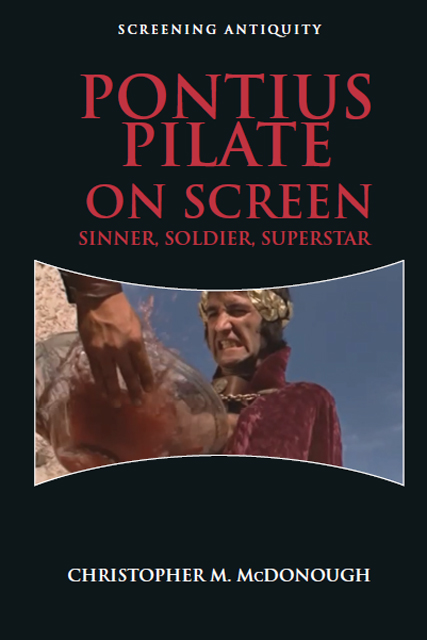Book contents
- Frontmatter
- Contents
- List of Figures
- Acknowledgements
- Series Editors’ Preface
- Frontispiece
- Prologue: ‘Do You Enjoy Being a Symbol, Pontius?’ The Trial of Pontius Pilate and Governor Collins
- 1 Quod Scripsi Scripsi
- 2 The Silent Pilate
- 3 The Roman in the Living Room: Pilate on TV in the Early 1950s
- 4 Mrs Pilate: Claudia Procula and Clare Boothe Luce
- 5 Pilate in CinemaScope, or Notes on Roman Camp
- 6 Finding Meaning in the Middlebrow: Pilate in the 1960s
- 7 What Is Truth? Pilate as 1970s Moral Relativist
- 8 Michael Palin’s Accent in Monty Python’s Life of Brian, and a Few Others
- 9 Grand and Not-So-Grand Inquisitors of the Reagan Age
- 10 ‘We at War’: Pilate for the New Millennium
- Epilogue: A Time of Handwashing
- Works Cited
- Index
5 - Pilate in CinemaScope, or Notes on Roman Camp
Published online by Cambridge University Press: 03 June 2023
- Frontmatter
- Contents
- List of Figures
- Acknowledgements
- Series Editors’ Preface
- Frontispiece
- Prologue: ‘Do You Enjoy Being a Symbol, Pontius?’ The Trial of Pontius Pilate and Governor Collins
- 1 Quod Scripsi Scripsi
- 2 The Silent Pilate
- 3 The Roman in the Living Room: Pilate on TV in the Early 1950s
- 4 Mrs Pilate: Claudia Procula and Clare Boothe Luce
- 5 Pilate in CinemaScope, or Notes on Roman Camp
- 6 Finding Meaning in the Middlebrow: Pilate in the 1960s
- 7 What Is Truth? Pilate as 1970s Moral Relativist
- 8 Michael Palin’s Accent in Monty Python’s Life of Brian, and a Few Others
- 9 Grand and Not-So-Grand Inquisitors of the Reagan Age
- 10 ‘We at War’: Pilate for the New Millennium
- Epilogue: A Time of Handwashing
- Works Cited
- Index
Summary
Speak the speech, I pray you, as I pronounced it to you, trippingly on the tongue: but if you mouth it, as many of your players do, I had as lief the town-crier spoke my lines. [ …] O, it offends me to the soul to hear a robustious periwig-pated fellow tear a passion to tatters, to very rags, to split the ears of the groundlings, who for the most part are capable of nothing but inexplicable dumbshows and noise: I would have such a fellow whipped for o’erdoing Termagant; it out-herods Herod: pray you, avoid it.
– Shakespeare, Hamlet 3.2In the 1950s and 1960s, as is noted in the last chapter, television brought drama out of the theatre and into the living room, and those teleplays involving figures from the Passion took on something of a domestic nature – Mr and Mrs Pilate are seen in their breakfast room in Day of Triumph, discussing Jesus while sharing cantaloupe, whereas a more troubled homelife formed the background of Family Theater’s Hill Number One as well as Studio One’s Pontius Pilate. Marshall McLuhan would call television a ‘cool medium’, one drawing the viewer into a private experience, while cinema was a ‘hot medium’ engulfing audiences with its scale and scope. If the coolness of TV showed Pontius Pilate in a more intimate light, a depiction more overblown and distancing would be found in the overheated genre of Hollywood film. In the big-screen performances of the mid-century, we have already seen Lowell Gilmore’s turn as a figure of comic relief in Day of Triumph, the actor giving a twist of the risible to his role as chief antagonist. Over the course of the 1950s, the figure of Pilate would grow more baroque and brash. Richard Boone in The Robe may act his part in a candid and straightforward manner, and there is an ironic quality to the Pilate of Basil Sydney playing a first-rate third wheel to lovers Rita Hayworth and Stewart Granger in Salome. With Frank Thring in Ben-Hur at the decade’s end, however, and Hurd Hatfield in King of King at the beginning of the 1960s, we find performances of the Roman prefect that are notable for their exaggerated gesturing and stagey affectation. If they do not ‘out-herod Herod’, as Hamlet would have it, they certainly out-Pilate Pilate.
- Type
- Chapter
- Information
- Pontius Pilate on ScreenSinner, Soldier, Superstar, pp. 91 - 112Publisher: Edinburgh University PressPrint publication year: 2022



